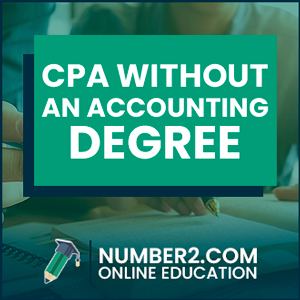 The CPA certification opens your career to many different opportunities that you wouldn’t have otherwise. It’s an important designation because it allows you to perform many legal tasks like auditing and taxation representation. Thus, it’s a credential that demands respect across all business fields.
The CPA certification opens your career to many different opportunities that you wouldn’t have otherwise. It’s an important designation because it allows you to perform many legal tasks like auditing and taxation representation. Thus, it’s a credential that demands respect across all business fields.
If you are a business major or financial professional, you may be asking, “Can I become a CPA without a degree in accounting?” The answer is, yes. You can get a CPA license in several different ways without having an accounting degree, but you will need to follow a number of steps in order to do so.
Let’s review the steps that non-accounting majors can take to get a CPA license without an accounting degree.
Do I need an Accounting Degree to become a CPA?
No, you don’t need an accounting degree to become a Certified Public Accountant. Each state’s CPA exam education requirements are slightly different. Not all states require that CPA candidates have a degree in accounting in order to take the CPA exam and become licensed.
These are four states that do not require an accounting degree for the CPA certification:
- Alaska
- Georgia
- Hawaii
- Maine
- Massachusetts
This means that you will be able to sit for the CPA exam in each of these states without a degree as long as your non-accounting degree meets their accounting and business educational requirements. Let’s take a look at the steps you will need to complete in each state to become certified.
How to get a CPA without an Accounting Degree in 5 Steps
Starting your career as a CPA in public accounting is often simpler than you anticipate. Here are the five steps to learn how to become a CPA without a degree in accounting:
1. Meet The State Minimum Accounting Educational Requirements
Before you are eligible to sit for the CPA exam, you must first meet the minimum education requirements set by your State Board of Accountancy. Although these states don’t require you to complete a bachelor’s degree in accounting, they do have different accounting credit hour education requirements that you must meet before you can take the exam.
Each state’s requirements are slightly different, so let’s take a look at each.
Alaska
Alaska does not require CPA candidates to complete a bachelor’s degree program majoring accounting. Candidates are only required to complete 15 credit hours of accounting courses regardless of their college major or degree program to qualify to sit for the CPA exam. Keep in mind that candidates will need to complete one year of work experience before obtaining their license once they pass the exam.
Georgia
Georgia requires candidates to complete at least 20 credit hours of accounting courses and 18 credit hours of upper-level accounting classes to obtain their CPA license. The basic courses such as Accounting 101 and Accounting 102 do not count toward the 18 credit hour minimum.
Hawaii
Hawaii requires that CPA candidates finish at least 18 credit hours of college level accounting coursework. Hawaii also demands professional experience after you pass the CPA exam, but they aren’t as strict as other states with their work experience requirements.
Maine
Maine only requires that students complete 15 credits of accounting courses, but this jurisdiction has specific experience requirements. Candidates must have at least 4,000 hours of working experience under a CPA to be certified by the Maine State board.
Massachusetts
Massachusetts requires 21 credit hours be completed in your college degree program. They also set rules on which courses can be included in this 21 credit hour requirement.
If you haven’t decided which jurisdiction you want to pursue your CPA license, you can use NASBA’s Internal Evaluation Services to check your tentative eligibility for a state jurisdiction. You can check individual states for $225 or have the service choose the three best jurisdictions that they can apply to for a fee of $350. Most states except North Carolina support the results of NASBA’s International Evaluation Services.
2. Meet The 150 Credit Hour Requirement For Non-Accounting Majors
Most state jurisdictions require at least 150 credit hours of college courses to be eligible for the CPA license. Since a typical bachelor’s degree program consists of only 120-125 credit hours, many candidates may have to finish a second major or graduate degree program to complete the 150 credit hour CPA requirement.
There are two common ways CPA candidates complete the 150 credit-hour requirement:
- Complete a second major. Many candidates who don’t major in accounting may choose to pick up an accounting major or accounting minor to fulfill the extra credits they need to get to 150 in total. This is also common for accounting majors who dual major in accounting and finance.
- Complete a graduate degree program. Many CPA candidates go for an MBA degree that includes finance or accounting subjects to meet up the remaining hours required along with accounting courses.
3. Pass the CPA Exam
After you have met the CPA education requirements for your state with your bachelor’s degree program, you can apply to take the CPA exam. The exam is a standardized test that is the same in every state. You will need to pass all 4 sections of the exam with a score of 75 or higher including:
-
Auditing and Attestation (AUD)
-
Business Environment and Concepts (BEC)
-
Financial Accounting and Reporting (FAR)
-
Regulation (REG)
The AICPA allows you an 18 month window of time to pass all four sections. Thus, once you pass the first section, you will need to pass the remain three in the next 18 months. Otherwise, you will need to retake the first section you passed. Keep in mind, you can the CPA exam sections in any order.
4. Take the Ethics Exam
Many states require that CPA candidates complete the AICPA ethics exam before they can become licensed. This is a self-paced, self-study exam that can be taken online after you pass the CPA exam. All of the study books and registration guides can be found on the AICPA website.
5. Meet The Work Experience Requirements
Most states require CPA candidates to complete some level of work experience before they are eligible to become licensed. Thus, after you complete your education and pass the CPA exam, you will need to complete a qualified CPA work experience program.
Some states would specifically demand a public accounting or auditing experience under a registered CPA. Others might also accept work experience in any government or academic institution.
You might not need an accounting degree if you have finance work experience post-graduation. You can contact your state board to check if your work experience qualifies according to the state jurisdiction you are applying to.
Can I Become a CPA with an Economics or Finance Degree?
Yes, you can become a CPA with a finance or economics degree as long as you meet your state’s CPA exam education requirements.
As mentioned before, candidates without accounting degrees can become CPAs provided they meet the particular state board’s rules for application. In most cases, they need to fulfill the 120-credit hours rule to be eligible to apply. Without an MBA in accounting, it could be difficult, but not impossible. To obtain the license, they need to have 25-30 credit hours more from work experience, i.e., 150 hours.
To complete the 150 credit-hour criteria, if you have Economics, Finance majors, or other non-accounting majors, you can opt for additional accounting courses through a second major or graduate degree program like an MBA.
If you decide not to pursue your CPA certification because of the educational requirements, you can also pursue another financial certification like the CFA or CMA. These accounting certifications give you many different career options in the accounting and finance world without the strict education requirements of the CPA.
What are the Accounting Career Alternatives without an Accounting Degree?
The two main accounting certification alternatives to the CPA are the CFA and CMA. Both credentials give you expansive accounting and finance career opportunities with a slightly different focus.
CFA (Chartered Financial Analyst)
CFA certification is offered by the CFA Institute. It is a three-section exam that tests the candidate’s knowledge of investment tools and analysis, portfolio management, wealth planning, and asset valuation. The total cost of appearing for each of the three levels if the candidate registers on time is around $3,300.
CFA Level 1 includes around ten subjects, including economics and financial basics. Level 2 tests the knowledge of investment valuation. Level 3 mainly covers knowledge of portfolio management.
A CFA charter holder has a wide range of career paths. They can become a trader, portfolio or risk manager, research analyst, or investment banker.
CMA (Certified Management Accountant)
CMA is offered by the Institute of Management Accountants. It is a certification in financial management and management accounting. It is a two-part exam. The first part is Financial Planning, Performance, and Analytics, and the second is Strategic Financial Management. The cost of the CMA exam comes out to approximately $700. There is a discount of around $150 for IMA members.
CMAs take up the task of financial planning, aiding in pricing decisions, economic analysis in manufacturing firms, control, leases and buildings, professional ethics, and budget preparation. They also make great COO in larger companies.
FAQ
How to study for the CPA exam without an accounting degree?
To study for the CPA exam without an accounting degree, most candidates need to get a CPA review course to properly prepare for the topics on the exam. The CPA exam prep course will cover the exam topics that were included in the colleges courses that non-accounting majors didn’t take. Keep in mind, only some states allow CPA candidates to study for the CPA exam without a degree in accounting.
What can I do with a CPA without accounting?
The career paths for Certified Public Accountants (CPAs) extend far beyond accounting careers. CPAs often turn into successful entrepreneurs, business analysts, financial professionals, and executive level officers in large companies. CPAs have a wide range of career paths other than becoming accountants.
Should I get a CPA if I don’t want to be an accountant?
Yes, you should get a CPA even if you don’t want to become an accountant. Your CPA certification will help you in whatever career path you choose to take. If you want to work in finance, management, or at the executive level in large companies, having a certified public accountant credential will help advance your career.
Can you take the CPA without studying?
Yes, you can take the CPA exam without studying, but it is not advisable. The AICPA recommends that CPA candidates spend at least 300-400 hours studying for the exam in order to pass. It’s a challenging test and you will most likely have a difficult time passing it without studying.

